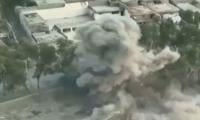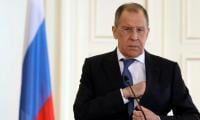of their area, whether they had been living in Tank, DI Khan, Karachi or any other parts of the country. The TTP Mehsud chapter was organisationally divided in two factions – loyal to Hakimullah Mehsud and Waliur Rehman Mehsud and both have their own offices and leaders.
“We, a total of six people from both sides, attended the court at Wali’s office and put our dispute before him. After hearing the case from both parties, he asked us to come after three days,” Jan continues his story.
They stayed for three days in a local hotel in the Miramshah bazaar. After a telephonic consultation with his commanders and Mehsud tribal elders based in Karachi through landline telephone, Wali resolved the issue fairly, he maintains.
Wali was affiliated with Khan Said alias Sajna, who was appointed head of the TTP after the killing of Waliur Rehman in a drone attack in May 2013.
“There were regular courts in Miramshah where Wali and other TTP commanders used to listen to and resolve dozens of cases on a daily basis,” he says
Miramshah link cut
Karachi’s Pashtun residents breathed a sigh of relief when the military started Operation Zarb-e-Azb in North Waziristan in June 2014 against the local and foreign Taliban militants.
During the first year, success of Zarb-e-Azb removed the sense of insecurity from among the residents of the country. On June 5 this year, the Inter-Services Public Relations (ISPR), marking the operation’s first anniversary, said the military had achieved a significant success in tribal areas, specially North Waziristan Agency and Khyber Agency, where militants’ strongholds, infrastructure and sanctuaries have largely been cleared.
Zarb-e-Azb has shattered the Taliban’s control-and-command system, affecting the activities of their Karachi factions, analysts and Pashtun elders believe.
“Zarb-e-Azb disrupted the Taliban militants’ free Karachi-Miramshah movement by destroying their offices and compelling them to flee the area,” Jan says, adding that it has also weakened them in Karachi.
However, the analysts claim that actual action against the TTP in Karachi started after the attack on Army Public School in Peshawar in December last year. Most of the key Taliban commanders and supporters in the city have been killed by the law enforcement agencies, especially Rangers after the Peshawar attack.
“We haven’t seen the Taliban killing anyone or asking traders for extortion in the last six months. The TTP militants have disappeared and the residents of Pashtun neighborhoods are now feeling secure,” says Jan.
However, Mehsud transporters and elders say that now police and other law enforcement agencies harass the community on the pretext that they have been involved in providing financial support to the TTP. “We have been forced to pay millions of rupees as protection money to avoid being targeted by the TTP, mainly because of the failure of the government to provide them security,” says a Mehsud tribal elder, adding that even a number of police officers in Taliban strongholds paid “protection money” to local TTP leaders during their control.
TTP factions in city
The TTP is not a monolith. There are four factions of the TTP operating in the city.
The TTP South Waziristan faction is led by Khan Said alias Sajna and mainly comprises Mehsud militants. The group has been operating independently after leaving the TTP in May last year.
Wali headed the group in Karachi but Khan Zaman alias Goonga is operational commander of the group in Karachi, but the law enforcement agencies, in the ongoing crackdown, have killed many of their key leaders and militants, forcing them to go into hiding or flee the city.
Anwaarullah*, a Mehsud tribal elder privy to recent development, says law enforcers have killed key leaders of the faction in the recent months. They include Abid Mucharr, Abid Chota, Zikria Mehsud, Mufti Javed, Khazan Gul, Zahidullah, Ubaidullah, Amir Zada and Khwajlak. Khan Zaman and Zawel are the only remaining important commanders of the faction in the city and there is no information about Wali’s whereabouts.
Another faction of the TTP Mehsud militants is led by Sheharyar Mehsud, who is the successor of Hakimullah Mehsud. Daud Mehsud, a former policeman in Karachi, heads the group in the city. The group has been weakened in Karachi because of their fighting with militants of the TTP Sajna faction. Most of them have left the city.
The TTP Swat chapter is loyal to the organisation’s central chief, Maulana Fazlullah. In Karachi, their organisational set-up is very secretive and mainly involved in the killing of Awami National Party leaders and policemen in the West district.
The TTP Mohmand faction that renamed itself the TTP-Jamaat Ahrar after parting ways with the TTP last year is led by Abdul Wali alias Omar Khalid Khurasani. The group has been weakened because of the killing of their key leaders and supporters by the law enforcement agencies.
*Names changed for privacy
This picture taken on January 30, 2023, shows commuters passing through the Empress Market in Pakistan's port city of...
Students give an Admission Entry Test for the Academic Session Fall 2025 in Aror University on April 13, 2025. —...
Students give a mega IT test at its PAF branch on Sharea Faisal on April 13, 2025. — Screengrab via...
Sindh Chief Secretary Sindh Asif Hyder Shah chairs a meeting on April 12, 2025. — Screengrab via...
This representational image of fishermen pull a fishing net ashore at the Clifton beach in Karachi. — AFP/FileThe...
Karachi Water & Sewerage Corporation CEO Ahmed Ali Siddiqui looks on in this image released on March 26, 2025. —...







